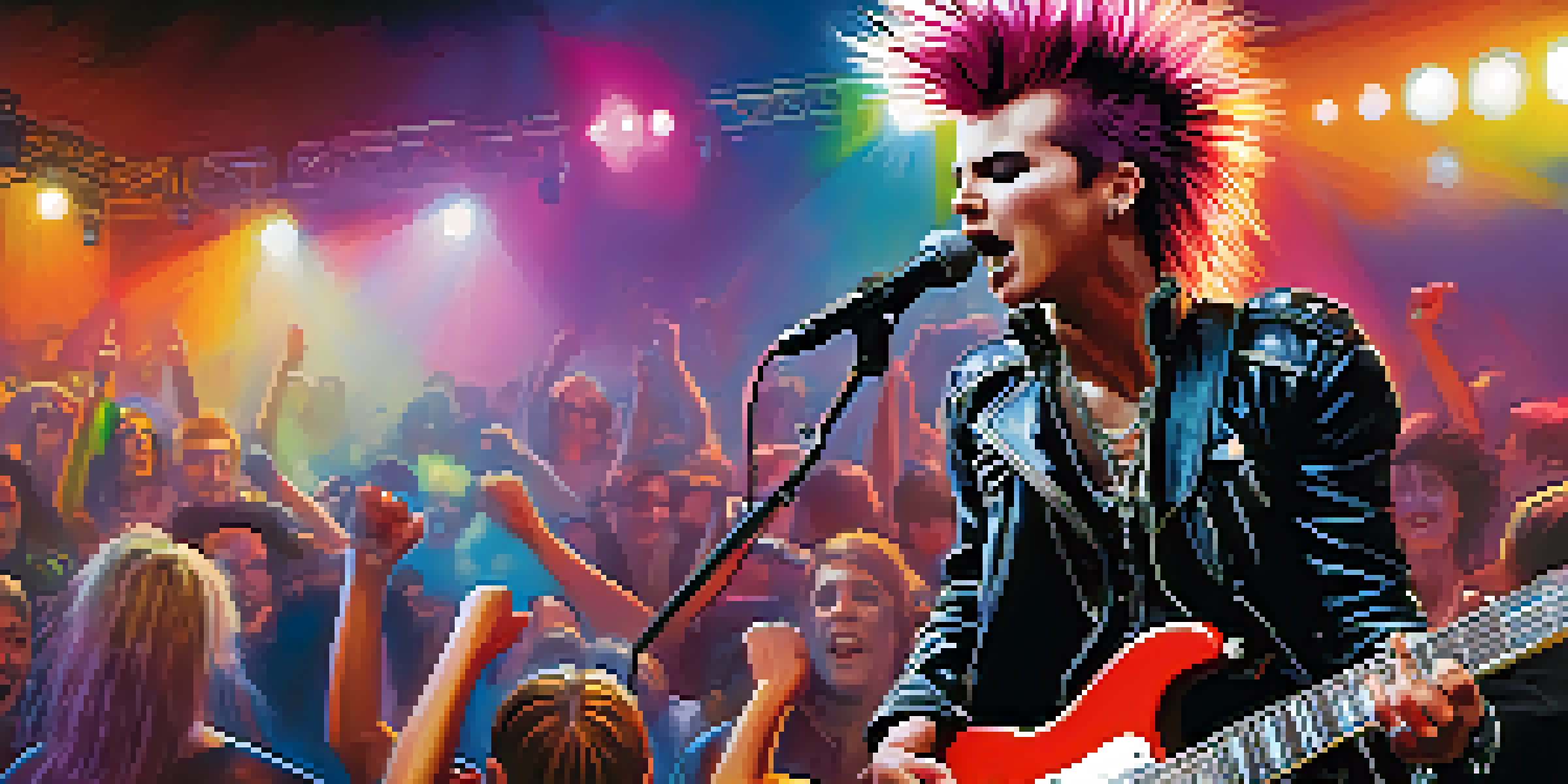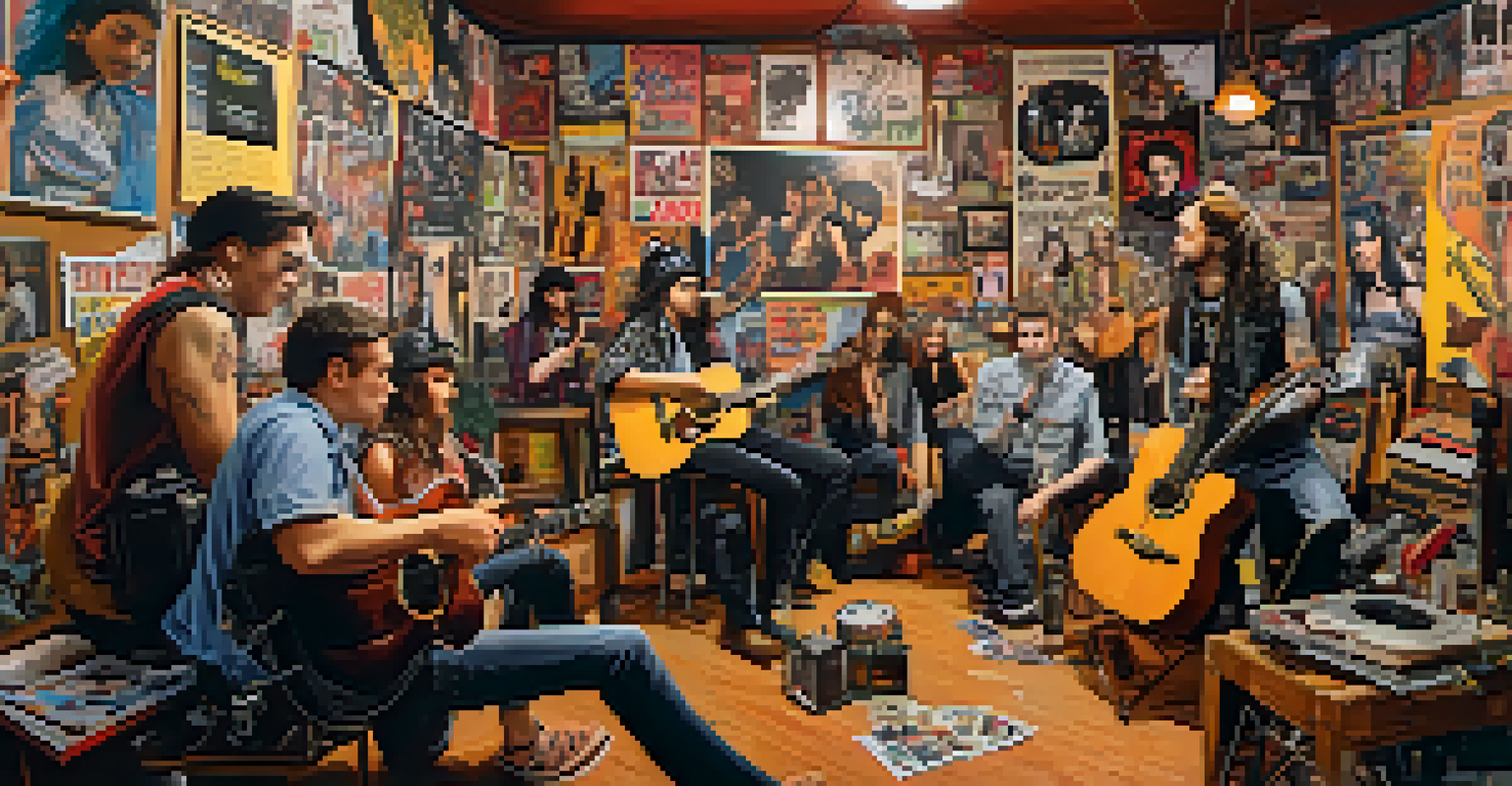How Punk Guitarists Revolutionized Playing Styles Worldwide

Punk's Raw Energy: A New Guitar Approach
Punk rock burst onto the scene in the mid-1970s, characterized by its raw energy and rebellious spirit. Guitarists like Johnny Ramone and Steve Jones broke away from technical complexity, favoring simple power chords and fast tempos. This stripped-down approach not only made punk accessible but also encouraged aspiring musicians to pick up a guitar and play. The emphasis on expression over perfection created a new playing style that resonated with a generation craving authenticity.
Punk is not just a genre of music, it's a way of thinking, a way of living.
By prioritizing a do-it-yourself (DIY) ethos, punk guitarists inspired countless players worldwide to embrace simplicity. For instance, the iconic sound of The Ramones relied heavily on just a few chords, showcasing that you don’t need to be virtuoso to create impactful music. This democratization of music allowed anyone with a guitar to participate, leading to the proliferation of punk bands across different regions. As a result, many musicians found freedom in simplicity, leading to a surge of creativity in other genres as well.
Moreover, the punk movement inspired various sub-genres, each adopting and adapting the guitar techniques introduced by early punk players. From hardcore punk to pop-punk, the influence of punk guitarists can be seen in the music of countless artists today. This legacy of innovation has created a lasting impact on how guitarists approach their craft, emphasizing authenticity and emotional expression over technical prowess.
The Power of Power Chords in Punk Music
Power chords are a hallmark of punk music, providing an aggressive and powerful sound that defined the genre. Guitarists like Joan Jett and Billie Joe Armstrong showcased how these simple two-note chords could create anthemic songs that resonate with fans. The beauty of power chords lies in their straightforwardness, allowing musicians to focus on rhythm and energy rather than complex fingerings. This created a sound that was both intense and relatable, making punk music anthems for the disenchanted.

The widespread use of power chords not only shaped punk music but also influenced rock and pop genres, demonstrating their versatility. Artists from Nirvana to Green Day incorporated this technique, further embedding it into the fabric of modern music. As a result, power chords became a staple in guitar playing, inspiring countless musicians to adopt this simplified yet effective approach. This shift encouraged a new generation of guitarists to explore creativity without the constraints of traditional playing styles.
Punk's DIY Spirit Empowers Musicians
The punk movement's do-it-yourself ethos encouraged musicians to create and share their music independently, fostering a sense of community and creative freedom.
Additionally, the power chord revolution allowed for more engaging live performances. With the focus on raw sound and high energy, punk guitarists often engaged in wild stage antics, making shows memorable experiences. This connection between performance and guitar playing helped solidify the punk ethos, emphasizing that music should be fun and liberating. The power chord’s enduring legacy can still be felt today, as guitarists continue to utilize this technique in various musical styles.
Fusing Punk with Other Genres: A Global Impact
Punk's influence extends beyond its own genre, leading to innovative fusions with various musical styles worldwide. For instance, bands like Bad Brains combined punk with reggae, creating a unique sound that resonated with diverse audiences. This blending of genres showcased the adaptability of punk guitar techniques, allowing them to find a home in different cultural contexts. As musicians experimented, new sub-genres emerged, each with its own twist on punk’s foundational elements.
The power of music can never be underestimated; it can change the world.
In many cases, punk guitarists incorporated local musical traditions into their sound, further enriching the genre. For example, Latin American punk bands often infused traditional rhythms into their music, creating a vibrant and distinctive style. This cross-pollination of ideas not only broadened punk’s appeal but also inspired musicians to break down genre barriers. As a result, punk's revolutionary spirit became a global phenomenon, influencing artists from Tokyo to Buenos Aires.
This global reach demonstrates how punk guitarists redefined what it means to play music, encouraging creativity regardless of cultural background. By embracing diverse influences, these musicians have helped create a rich tapestry of sounds that continue to evolve today. The spirit of collaboration and experimentation remains a crucial aspect of punk, inspiring future generations of guitarists to explore and innovate within their own musical landscapes.
DIY Ethos: Empowering Musicians Everywhere
The punk movement championed a do-it-yourself (DIY) ethos that fundamentally shifted how musicians approached their craft. Artists like Ian Mackaye of Minor Threat emphasized self-production, encouraging others to create and distribute their music without relying on major labels. This approach not only democratized music creation but also fostered a sense of community among musicians and fans. By taking control of their artistic output, punk guitarists inspired a wave of independent creativity across the globe.
This DIY mentality extended beyond music production to include everything from album artwork to concert promotion. Punk musicians often organized their own shows and created zines, amplifying their voices in a world dominated by commercial interests. This grassroots movement empowered countless individuals to express themselves and share their stories through music. It reinforced the idea that anyone could be a musician, regardless of their background or resources.
Power Chords Define Punk's Sound
Power chords became a hallmark of punk music, allowing artists to create impactful songs with simplicity and energy, influencing various genres beyond punk.
The impact of the DIY ethos can still be seen today in various genres, as independent artists continue to thrive outside the traditional music industry. Platforms like Bandcamp and SoundCloud have made it easier than ever for musicians to share their work with the world. Punk guitarists paved the way for this shift, demonstrating that passion and creativity can overcome barriers. Their legacy of empowerment continues to inspire a new generation of artists to pursue their musical dreams.
The Role of Punk Guitarists in Social Movements
Punk guitarists have long been at the forefront of social and political movements, using their music as a platform for change. Bands like The Clash and Dead Kennedys addressed pressing issues such as war, poverty, and inequality through their lyrics and performances. By integrating social commentary into their songs, these musicians amplified the voices of marginalized communities and called for action. This commitment to activism helped solidify punk's role as not just a music genre but a movement with a purpose.
The powerful messages delivered through punk music resonated with fans who felt disillusioned by societal norms. Punk guitarists often used their music to challenge the status quo, inspiring listeners to question authority and fight for their rights. This rebellious spirit became a rallying cry for many, uniting individuals around shared values and experiences. The emotional connection forged through this music fostered a sense of solidarity among fans, empowering them to take a stand.
By addressing social issues through their art, punk guitarists have influenced countless movements and inspired artists in various genres to tackle similar themes. This legacy of activism continues today, with many contemporary musicians following in their footsteps. The impact of punk on social movements highlights the power of music as a tool for change, reminding us that guitarists can play a crucial role in shaping society. Through their passion and commitment, punk musicians have left an indelible mark on the world.
The Evolution of Guitar Techniques in Punk Music
As punk music evolved, so did the techniques employed by guitarists. While early punk relied heavily on power chords, later musicians began to experiment with more complex riffs and melodies. Bands like Bad Religion and Rancid introduced intricate guitar work while maintaining the punk ethos of speed and aggression. This evolution showcased the adaptability of punk guitar styles, proving that innovation can coexist with tradition.
Additionally, the rise of pop-punk in the 1990s brought a new wave of technicality to punk guitar playing. Bands like Blink-182 and Sum 41 incorporated catchy hooks and solos, appealing to a broader audience while still retaining punk's core values. This blend of accessibility and complexity opened the door for even more musicians to explore the genre. As a result, the landscape of punk music continued to grow, attracting fans and players from diverse backgrounds.
Punk Guitarists Inspire Social Change
Punk guitarists used their music to address social and political issues, uniting fans around shared values and inspiring activism through their art.
The continual evolution of guitar techniques in punk reflects the genre's resilience and commitment to pushing boundaries. As new generations of musicians emerge, they build upon the foundation laid by their predecessors while infusing their unique styles. This ongoing journey of exploration ensures that punk music remains relevant and influential, inspiring future guitarists to innovate and keep the spirit of punk alive in their playing.
Legacy of Punk Guitarists: Inspiring Future Generations
The legacy of punk guitarists is evident in the music of countless artists today, transcending genres and borders. From the grunge movement in the 1990s to contemporary indie rock, the influence of punk can be heard in the sound and attitude of many musicians. Guitarists continue to draw inspiration from the raw energy and authenticity that defined the punk era, infusing their styles with a rebellious spirit. This connection to punk's roots serves as a reminder of the genre's profound impact on modern music.
Moreover, punk guitarists have paved the way for a diverse array of musical styles, encouraging artists to explore their creativity without fear of judgment. By exemplifying the importance of individuality and self-expression, they have inspired a new generation to embrace their unique voices. This encouragement has led to a flourishing of diverse sounds and styles, making music more inclusive and representative of various experiences. The spirit of punk continues to resonate, motivating musicians to challenge conventions and push boundaries.

As aspiring guitarists look to the future, the lessons learned from punk guitarists remain invaluable. The importance of authenticity, community, and social consciousness are just a few aspects that continue to shape the musical landscape. By honoring the legacy of punk, new artists can create impactful music that speaks to their own experiences and values. Ultimately, the influence of punk guitarists will endure, inspiring future generations to pick up their guitars and make their voices heard.